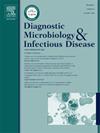心脏移植受者术后由裂孔曲霉引起的纵隔炎一例报告及文献复习
IF 2.1
4区 医学
Q3 INFECTIOUS DISEASES
Diagnostic microbiology and infectious disease
Pub Date : 2025-03-08
DOI:10.1016/j.diagmicrobio.2025.116796
引用次数: 0
摘要
急性纵隔炎是心脏移植术后常见的感染性并发症。病因通常是细菌性的,通过适当的源头控制和抗菌治疗,这种情况往往有良好的结果。临床上,它通常表现为急性,手术伤口早期裂开,全身受累,需要及时手术干预。真菌病因是罕见的,通常与严重免疫功能低下的患者,赋予一个惨淡的预后。虽然大多数真菌感染是由烟曲霉引起的,但广泛使用唑作为预防性治疗导致未知物种和其他抗唑真菌感染的增加,对治疗提出了重大挑战。我们报告了一例31岁的心脏移植受者,在复杂的术后过程和体液排斥反应后,由于裂口曲霉引起的术后纵隔炎。尽管适当的抗菌治疗和源头控制,感染进展不利。本文章由计算机程序翻译,如有差异,请以英文原文为准。
Post-surgical mediastinitis caused by Aspergillus calidoustus in a heart transplant recipient: A case report and review of the literature
Acute mediastinitis is a common infectious complication following heart transplant surgery. The etiology is typically bacterial, and the condition tends to have a favourable outcome with appropriate source control and antimicrobial treatment. Clinically, it often presents acutely, with early dehiscence of the surgical wound and systemic involvement, necessitating prompt surgical intervention. Fungal etiology is rare and usually associated with severely immunocompromised patients, conferring a dismal prognosis. Although most fungal infections are caused by Aspergillus fumigatus, the widespread use of azoles as prophylactic treatment has led to an increase in infections by unknown species and other azole-resistant fungi, posing a significant therapeutic challenge.
We present the case of a 31-year-old heart transplant recipient who developed post-surgical mediastinitis due to Aspergillus calidoustus following a complicated postoperative course and humoral rejection. Despite appropriate antimicrobial therapy and source control, the infection progressed unfavourably.
求助全文
通过发布文献求助,成功后即可免费获取论文全文。
去求助
来源期刊
CiteScore
5.30
自引率
3.40%
发文量
149
审稿时长
56 days
期刊介绍:
Diagnostic Microbiology and Infectious Disease keeps you informed of the latest developments in clinical microbiology and the diagnosis and treatment of infectious diseases. Packed with rigorously peer-reviewed articles and studies in bacteriology, immunology, immunoserology, infectious diseases, mycology, parasitology, and virology, the journal examines new procedures, unusual cases, controversial issues, and important new literature. Diagnostic Microbiology and Infectious Disease distinguished independent editorial board, consisting of experts from many medical specialties, ensures you extensive and authoritative coverage.

 求助内容:
求助内容: 应助结果提醒方式:
应助结果提醒方式:


